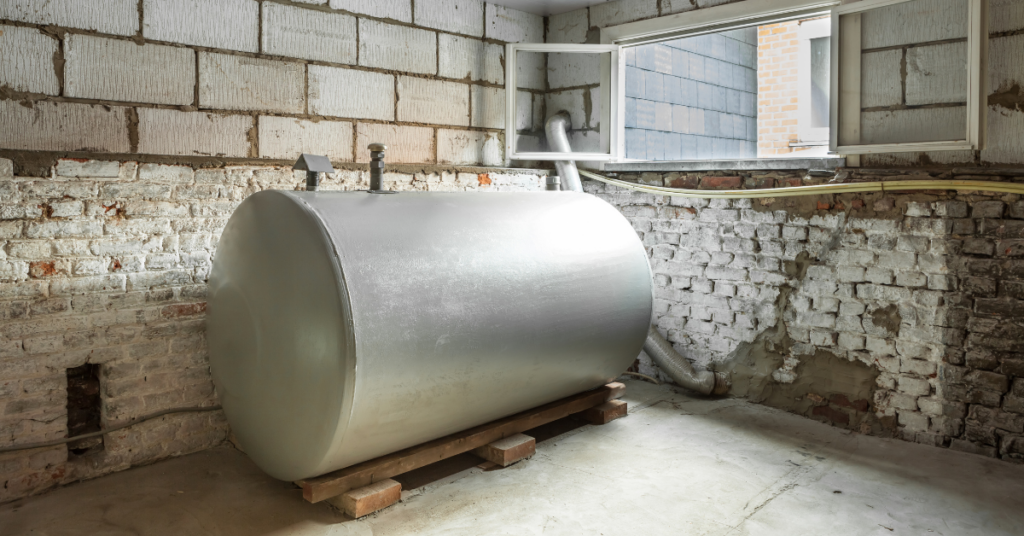
Miller Environmental Group knows the importance of inspecting your oil tank, as a damaged tank can lead to an expensive environmental nightmare that can cost you….big time. The average oil tank has a life expectancy of about 20-25 years. After this timeframe, tanks begin to deteriorate and cause issues such as sludge formation, corrosion, rust and, most importantly of all, leaks that can lead to contamination. Let’s review the signs of a leaking tank, what to be aware of, an inspection checklist and determining if service or replacement is needed.
Signs of a Leaking Tank
There are many signs of a leaking tank as they can be either subtle or unmistakable. Whether an oil tank is inside or outside, they’re sometimes not in plain sight, making much needed repairs or leaks unnoticeable. The Environmental Protection Agency (SPCC Rule) advises you test and inspect your tanks on a regular schedule. While it’s always important to inspect for leakage, there are a few other indicators that your tank should be serviced or replaced.
Take samples of your oil tank to determine if water is present. Because water is heavier than fuel, it will sink to the bottom of the tank and due to contaminants oftentimes found in water, it can cause build-up of bacteria, rust, corrosion, sludge and even condensation inside the tank, which can cause significant damage.
Always smell and look for signs of leakage. Although it’s normal to have an odor of oil after the tank is filled, stay aware if the odor lasts more than an hour or two after the tank is filled. This could indicate bigger problems. Oil fumes aren’t just unpleasant, they can be hazardous to your health. Additionally, keep an eye out for the surrounding areas on and around your tank. If you notice discoloration/stains, dying foliage/grass around the tank, or droplets along the seams or joints of the tank, contact a professional immediately. If these are left unaddressed, they can potentially lead to a serious environmental impact that can be very expensive to remediate.
Oil Tank Inspection – Keys to Remember
It’s important to regularly inspect your oil tank, regardless of its age, to prevent and stop a small problem before it turns into a costly mistake. Some leaks can be repaired, but if other signs point to a deteriorating oil tank, you’ll need to replace it immediately.
Inspect your tank and check for:
- Stability: Ensure all the legs of the tank are level and secure.
- Broken gauges: Regularly make sure gauges are functioning correctly.
- Vent pipe clogs: Make sure the vent pipes are free of debris.
- Fuel feed leaks: Inspect the fuel feed lines for signs of leaking, especially around the valves.
- Signs of a leak: Even a tiny pinhole can cause massive headaches. Check for odors, wet spots, dead foliage/grass and stains.
- Weather Exposure: If the tank is outside, make sure it is capped tightly to prevent water from then cover it to keep water from infiltrating the tank.
- Malfunctioning vent alarm: If your oil tank has a vent alarm, make sure it sounds when the tank is filled.
- Rust: Any oil tank that has signs of rust is in danger of failing. It will also pollute your oil which could lead to many other problems.
Time to Service or Replace?
Connecting with a professional to inspect your tank is the best way to fully understand your options. Depending on the age/condition of the tank, and the issues you’re experiencing, a professional will be able to make necessary repairs to improve the lifespan of your tank. However, replacing is sometimes the best option, especially if leaking excessively, showing signs of deterioration, or has reached the end of its lifespan.
Miller Environmental Group is here, 24/7/365
Miller Environmental Group is equipped and experienced in handling all types of spill cleanups, but we’re also experts in removing aboveground storage tanks (AST) and underground storage tanks (UST). Leaks or spills can quickly spiral out of control, Call Miller Environmental Group immediately, no matter how big or small. We’re available 24/7/365, ready to service the Maryland, D.C., Virginia, Pennsylvania, and Delaware Area. We can be reached via email info@aceenvironmental.net or on our emergency hotline (410) 354-8030.
